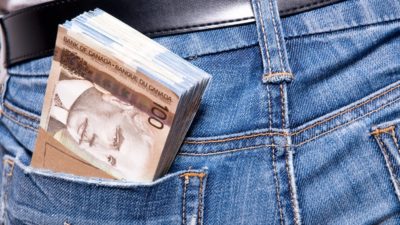The pandemic triggered dividend cuts in several real estate investment trusts (REITs), including American Hotel Income Properties and H&R REIT (TSX:HR.UN). American Hotel eliminated its entire dividend. It wasn’t as bad at H&R REIT, which cut its cash distribution by half last year. The REIT is still good for income.
A solid dividend
H&R REIT’s first-quarter results reveal a very safe dividend. Its funds-from-operations (FFO) payout ratio was 43.5% — much lower than the 76.5% from a year ago. FFO fell 12% year over year. On a per-unit basis, FFO fell 11%. This suggests that management prudently cut its cash distribution much more than needed, providing more financial flexibility for the diversified REIT.
Since H&R REIT’s payout ratio is so low, investors can expect its cash distribution to be at least partially restored down the road. It has done this before. During the global financial crisis around 2009, the REIT cut its cash distribution, only to start restoring it by 2010.
Currently, H&R REIT yields 4.2%. However, if it were to restore its cash distribution to the pre-pandemic levels with a payout ratio of, say, 76.5%, we’re looking at a yield on cost of more than 7.4%!
When will H&R REIT start restoring its dividend?
We can only take an educated guess on when H&R REIT will start restoring its dividend. First and foremost, management focuses on keeping the company’s financial position strong and strategically positioning its real estate portfolio.
From 2016 to 2019, the REIT’s debt to total assets was in the 44% range. That ratio increased to about 48% last year due primarily to fair-value adjustments to certain office and retail properties totaling $1.2 billion.
Importantly, H&R REIT has relatively high debt repayments scheduled for this year and next year. Specifically, about 35% of its debt repayment, totaling $2.06 billion, is due through 2022. Another 24%, totaling nearly $1.4 billion, is due from 2023 through 2024. That totals about 59% of its debt repayment. About 60% of the debt to be repaid over these four years is mortgage payments, totaling nearly $2.1 billion, which should free up some room on the balance sheet for potentially more acquisitions.
Moreover, the company hasn’t remained idle. In May, management noted that “In the past year we have completed substantial dispositions and acquisitions, completed successful developments and advanced future development projects which will commence in 2021 and 2022, and expect to complete further property dispositions in the remainder of 2021. These activities have laid the foundation for more significant strategic changes, which we hope to provide more details of in coming months.”
To be conservative, my educated guess is that H&R REIT could begin restoring its cash distribution by 2023.
Should you buy H&R REIT?
H&R REIT’s office and retail assets make up 38% and 31%, respectively, of its portfolio’s fair value as of Q1 2021. That’s close to 70% of the portfolio! However, they provide higher cap rates than its residential and industrial portfolios.
Its office portfolio also has an average remaining lease term of about 12 years with a recent occupancy of 99.7%. Similarly, its retail portfolio has an average remaining lease term of about 6.5 years with a recent occupancy of 90.3%. Its residential and industrial portfolios remain resilient during this testing time.
The North American economy is recovering. COVID-19 vaccine rollouts are helping on that matter. H&R REIT is also a recovering story with about 28% upside potential to return to its normalized levels.
If you’re looking for a value name in this expensive market, you can consider H&R REIT, which is still depressed from pre-pandemic levels and offers a safe 4.2% yield that can go higher from here.








